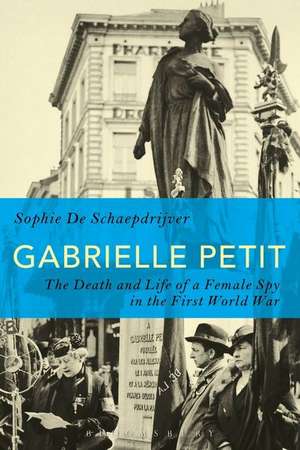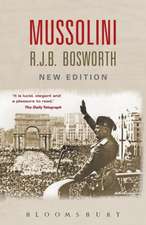Gabrielle Petit: The Death and Life of a Female Spy in the First World War
Autor Sophie De Schaepdrijveren Limba Engleză Hardback – 28 ian 2015
| Toate formatele și edițiile | Preț | Express |
|---|---|---|
| Paperback (1) | 179.98 lei 6-8 săpt. | |
| Bloomsbury Publishing – 28 ian 2015 | 179.98 lei 6-8 săpt. | |
| Hardback (1) | 715.73 lei 6-8 săpt. | |
| Bloomsbury Publishing – 28 ian 2015 | 715.73 lei 6-8 săpt. |
Preț: 715.73 lei
Preț vechi: 915.34 lei
-22% Nou
Puncte Express: 1074
Preț estimativ în valută:
136.95€ • 143.00$ • 113.09£
136.95€ • 143.00$ • 113.09£
Carte tipărită la comandă
Livrare economică 15-29 aprilie
Preluare comenzi: 021 569.72.76
Specificații
ISBN-13: 9781472590879
ISBN-10: 1472590872
Pagini: 272
Ilustrații: 6 bw illus
Dimensiuni: 156 x 234 x 20 mm
Greutate: 0.54 kg
Editura: Bloomsbury Publishing
Colecția Bloomsbury Academic
Locul publicării:London, United Kingdom
ISBN-10: 1472590872
Pagini: 272
Ilustrații: 6 bw illus
Dimensiuni: 156 x 234 x 20 mm
Greutate: 0.54 kg
Editura: Bloomsbury Publishing
Colecția Bloomsbury Academic
Locul publicării:London, United Kingdom
Caracteristici
An original study of the role of women in wartime, this book redresses the gender imbalance in military history
Notă biografică
Sophie De Schaepdrijver is Associate Professor of History at Penn State University, USA. She is an award-winning historian of the social and cultural history of the First World War.
Cuprins
IntroductionProloguePart 1: LifeChapter 1: Disinheritance, 189 3- 1914Chapter 2: Engagement, August 1914 - August 1915Chapter 3: War Work, August 1915 - February 1916Chapter 4: Confrontation, February 1916 - March 1916Chapter 5: 'Utterly Alone', March 1916 - November 1918Part 2: MemoryChapter 6: Memory Agents, 1918 - 1919Chapter 7: National Heroine, 1919 - 1923Chapter 8: Palimpsest, 1919 - 2003ConclusionBibliographyIndex
Recenzii
Accessible and rewarding ... De Schaepdrijver helps to restore Petit's memory while asking fascinating questions about why we should remember and how such commemoration serves us.
De Schaepdrijver's book is a model of how the cultural history of the war should be written.
Minutely researched.
A Book of the Year 2015
De Schaepdrijver meticulously pieces together the fragments [of Petit's life and death] that she has gathered from contemporary and inter-war documents ... A richly detailed account which will especially appeal to social historians of the First World War and those interested in memorialisation.
De Schaepdrijver has painstakingly reconstructed Petit's short life from fragments tucked away in Belgian, German, and British archives ... [She] tells Petit's interconnected stories with clarity and verve ... [A] fascinating book.
The result of detailed research in a variety of archives ... Schaepdrijver's book is a welcome corrective to such neglect [as Petit has received.]
De Schaepdrijver's research is meticulous; her prose is elegant, engaging, and often poignant ... A triumph of scholarship, even in the book's most biographical moments the reader consistently has a strong sense of the many national and international currents uniquely illuminated by this one remarkable life and its afterglow.
An excellent study of the life and afterlife of a young woman turned spy turned martyr turned icon of sacrifice. It is a fine and powerful addition to the growing literature on the cultural history of the Great War.
An unusual story, beautifully told, of a young woman who spied for the Allies behind the Western Front, was captured by the Germans, and executed. Unlike the death of nurse Edith Cavell, whose execution caused a worldwide uproar, Gabrielle Petit's fate went almost unnoticed at first. Only after the armistice would her contemporaries, to whom she was a modern Joan of Arc, raise her to the status of national heroine. With all the skill of a Natalie Zemon Davis, Sophie De Schaepdrijver brings to life a figure who fought the first German occupation of Europe in the twentieth century. This is at once the biography of a woman and her achievement of autonomy, and a riveting account of dangerous intelligence work, hitherto previously unknown. The sophisticated world of German counter-intelligence that rolled up the Allied espionage networks is equally well treated. Furthermore, the book analyses the construction of memory, that vital ingredient of our culture. Using biography to unlock the multiple histories of the war, it is nothing short of a triumph of modern historiography. A must-read for all those interested in the First World War.
De Schaepdrijver's book is a model of how the cultural history of the war should be written.
Minutely researched.
A Book of the Year 2015
De Schaepdrijver meticulously pieces together the fragments [of Petit's life and death] that she has gathered from contemporary and inter-war documents ... A richly detailed account which will especially appeal to social historians of the First World War and those interested in memorialisation.
De Schaepdrijver has painstakingly reconstructed Petit's short life from fragments tucked away in Belgian, German, and British archives ... [She] tells Petit's interconnected stories with clarity and verve ... [A] fascinating book.
The result of detailed research in a variety of archives ... Schaepdrijver's book is a welcome corrective to such neglect [as Petit has received.]
De Schaepdrijver's research is meticulous; her prose is elegant, engaging, and often poignant ... A triumph of scholarship, even in the book's most biographical moments the reader consistently has a strong sense of the many national and international currents uniquely illuminated by this one remarkable life and its afterglow.
An excellent study of the life and afterlife of a young woman turned spy turned martyr turned icon of sacrifice. It is a fine and powerful addition to the growing literature on the cultural history of the Great War.
An unusual story, beautifully told, of a young woman who spied for the Allies behind the Western Front, was captured by the Germans, and executed. Unlike the death of nurse Edith Cavell, whose execution caused a worldwide uproar, Gabrielle Petit's fate went almost unnoticed at first. Only after the armistice would her contemporaries, to whom she was a modern Joan of Arc, raise her to the status of national heroine. With all the skill of a Natalie Zemon Davis, Sophie De Schaepdrijver brings to life a figure who fought the first German occupation of Europe in the twentieth century. This is at once the biography of a woman and her achievement of autonomy, and a riveting account of dangerous intelligence work, hitherto previously unknown. The sophisticated world of German counter-intelligence that rolled up the Allied espionage networks is equally well treated. Furthermore, the book analyses the construction of memory, that vital ingredient of our culture. Using biography to unlock the multiple histories of the war, it is nothing short of a triumph of modern historiography. A must-read for all those interested in the First World War.























